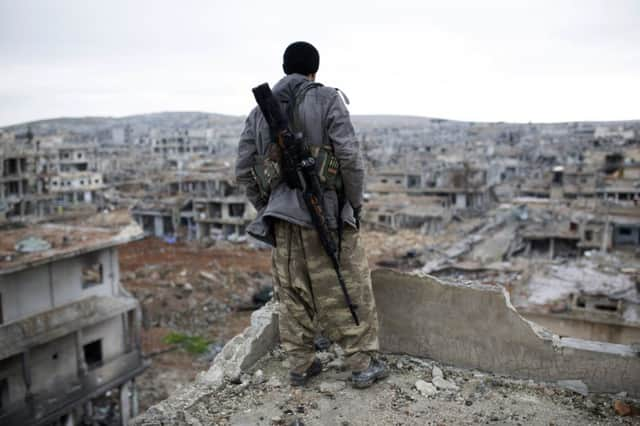Coalition air strike kills IS chemicals expert


US Central Command said Abu Malik, described as a mid-level operator, was killed near Mosul on 24 January.
It said he worked at the Muthana chemical weapons plant before joining al-Qaeda in Iraq in 2005. He then joined IS, bringing his chemical weapons expertise to the terror group.
Advertisement
Hide AdAdvertisement
Hide Ad“His death is expected to temporarily degrade and disrupt the terrorist network, and diminish IS’s ability to potentially produce and use chemical weapons against innocent people,” the US military said.
US officials had not publicly referred to Malik previously as a key figure, but said his knowledge of chemical weapons was a potential threat to civilians in the region.
FOLLOW US
SCOTSMAN TABLET AND MOBILE APPS
There has been no sign that the IS group possesses a major chemical weapons arsenal. But there have been allegations the jihadists have employed chlorine gas, which is classified as a “choking agent,” though not as lethal as nerve agents. Last year, Iraqi police officers suffered from dizziness and vomiting after clashing with jihadist fighters north of Baghdad. It was thought chlorine gas may have been to blame.
Abu Malik, also known as Salih Jasim Mohammed Falah al-Sabawi, had been “involved in operations to produce chemical weapons in 2005, and planned attacks in Mosul with AQI [al-Qaeda in Iraq],” said a defence official.
“Based on his training and experience, he was judged to be capable of creating harmful and deadly chemical agents,” said the official, who spoke on condition of anonymity.
“We know Isil [alternative name for IS] is attempting to pursue a chemical weapons capability, but we have no definitive confirmation it currently possesses chemical weapons,” the official said.
Mosul remains a hotly contested city in northern Iraq – last year, IS fighters took control of it during an aggressive push to control new territory. Earlier this month, Kurdish forces fired rockets into Mosul, the first move of its kind since IS took over. Islamic State militants seized the Muthanna facility last June. It contained a stockpile of old weapons, but officials said didn’t believe that the militants would be able to create a functional chemical weapon from the material.
The weapons there were considered old, contaminated and difficult to move.
Advertisement
Hide AdAdvertisement
Hide AdThe US and its allies has been targeting IS positions in Iraq and Syria since last August, destroying military equipment and killing IS fighters. Military chiefs are hoping they can retake the key city of Mosul with the help of Iraqi forces this spring. But there are concerns that Iraqi troops are not yet ready to do the fighting needed on the ground.
IS controls large areas of Syria, where the government has been destroying its chemical weapons, but not all the stockpiles have been accounted for.
Coalition air strikes have killed about 6,000 members of the Sunni radical group, eliminating half of its leadership, General Lloyd Austin, head of US Central Command, said.
The US-led coalition has carried out more than 2,000 air raids against IS in Syria and Iraq since 8 August, including some bombing runs that targeted senior militants.